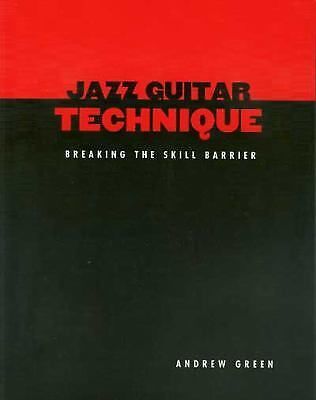
This is one of three books from New York City jazz guitarist Andrew Green.
I bought this years ago when I was still living in the San Francisco Bay Area and have worked through it off and on.
I have to say that after studying it over the years, I now have an even deeper appreciation for how amazing the book is.
Published back in 2000, the book was initially released directly by Microphonic Press, Andrew’s publishing company. He then secured a print and distribute contract with Mel Bay Publications in June 2012. Googling what Andrew is up to now, it appears that Andrew is currently working as a copy editor and writer.
Back to the book, this book is the first of the three books Andrew released. Following up on this, he wrote Jazz Guitar Structures and Jazz Guitar Comping.
The book is divided into 12 sections:
- INTRODUCTION
- BASICS
- CROSS-STRING STUDIES
- TRIADS
- COMPLEX RHYTHMS
- ADVANCED STUDIES
- PHRASING
- GRABBING CHORDS
- LINES AND CHORDS
- ETUDES
- APPENDIX (90 Reasons Why You Need Good Technique)
- CHECK IT OUT (A Selective Discography)
The first half of the book addresses specific technical challenges like learning the neck, picking, cross string studies, triad arpeggio fingerings and rhythms.
The second half of the book includes an immense selection of interesting linear melodic ideas that provide context to what Andrew teaches in the earlier half.
I found the chapters on phrasing and mixing lines and chords to be immensely useful.
Looking at the book over the years, I realized that the biggest takeaway in the beginning was Andrew’s approach to fretting hand fingering that deliberately avoids barres or rolling your finger to get notes on adjacent strings on the same fret.
This was unusual for me at first, but was the single biggest light bulb moment I got from the book years ago.
Working through it again now, I got even more milleage from it. It is important to note that there is no audio recording to accompany the book. This means that you have to already be familiar with jazz phrasing and articulation to get the most benefit from the book. The selective discography at the end of the book is a good list to start with.
In APPENDIX (90 Reasons Why You Need Good Technique) – Andrew lists out 90 songs that are good reasons why you need fluid flowing technique to play this music. I would say it would be a good idea to learn these songs to apply the technique that you’ve learned from this book.
In conclusion, this book is one that I recommend highly. It’s challenging and it has some of the best modern sounding phrases that are both idiomatic and technical at the same time. This is the good stuff.
Pros: Amazing book with A LOT of great lines, exercises and technique exercises that work.
Cons: Not really a con in the real sense, but it’s worth pointing out that the fretting hand fingering may feel uncomfortable or unusual at first.
TLDR: A musical jazz centric guitar technique book that overdelivers and gives potentially years of practice material for the serious guitarist.
[Where to buy] You can buy this book from Amazon, eBay or direct from Mel Bay. If you’re planning on getting the eBook version, I recommend buying direct from Mel Bay as they often have discounts too on their website.
[Submissions for Review Consideration]
- Are you an author who wrote a jazz, guitar or music book?
- Have you created a DVD or an online video course or subscription based website?
- Would you like me to review your book/course?
Please send me a message at azsamad3 at gmail.com with:
For courses: a link to the course/video/product + access info etc.
For books: a link to the book (Dropbox) or PDF attachment (if it’s small) for review consideration.
Depending on whether I dig the book/course, I’ll let you know if I do plan to review it!
I cannot guarantee a review for every submission & if I’m not too into it, I may opt not to review it. I mean, it’s better to get a good review that for me to write a bad review just because it’s not a match for the kind of stuff I dig right? :p
NOTE: All reviews reflect my honest personal opinion so be aware that I will point out both cool Pros and Cons that I see in the work. You dig?